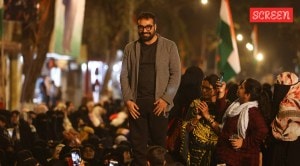Stay updated with the latest - Click here to follow us on Instagram
Gujarat: ‘We remember our youth… here we learnt to be happy again’
A group of seven Polish nationals, orphaned during WWII, revisit Balachadi camp where they were given shelter by Jamnagar Maharaja
 Jerzy Jomaszek and Jadwiga met at the camp 76 years ago. They married in 2008 when they were in their 80s. Javed Raja
Jerzy Jomaszek and Jadwiga met at the camp 76 years ago. They married in 2008 when they were in their 80s. Javed Raja
It was in the barracks of Balachadi camp in then Nawanagar, now Jamnagar, where Jerzy Jomaszek and Jadwiga, both now 90, met for the first time as 14-year-old teenagers. At the camp, Jerzy had developed liking for Jadwiga, but, he says, till date Jadwiga never approved of him. After staying at the camp for almost 18 months, Jerzy left for East Africa to join another Polish camp, while Jadwiga returned to Poland.
Both got married, had families and lived separate lives in Poland. They, however, stayed in touch and shared memories of Balachadi camp. It was only in 2008, when 80-year-old Jerzy kneeled down to Jadwiga and proposed to her after both of their spouses died.
This time, after more than seven decades Jadwiga accepted his proposal. “We might be the oldest couple here but I bet we look the youngest,” says Jerzy with a big smile.
The couple was a part of the seven-member contingent from Poland — referred to as ‘Survivors of Poland’ — who have returned to Balachadi, the camp where nearly one thousand Jewish and Catholic children came from Serbia in 1942 and stayed for almost six years.
The group of seven, a majority in their late 80s and early 90s, were accompanied by their family members. They gathered at Sainik School, where once the camp stood, to commemorate 100 years of the regaining of Independence by the Republic of Poland and the special Indo-Polish bond strengthened by the efforts of then Maharaja of Nawanagar Jam Saheb Digvijaysinhji who sheltered the Polish children, orphaned during the Second World War, in his estate.
Looking at the building that now houses the school, Jerzy says, “This building is incomparable to the barracks. Around 30 of us shared a single barrack. It is like Poland, a small country against India, a continent in its own.”
It was more than nostalgia for 51-year-old Tomek Gutowski, whose father, 84-year-old Roman, had once stayed in those barracks. Accompanied by his 22-year-old son Maceij, the three generations of Gutowski family came together to relive those memories.
“This is the place about which I have heard from my father since I was two, as I did not have fairy tales,” says Tomek, directing to the sea shore from the terrace of Maharaja’s then summer palace with an uncontrolled excitement on his face. “It is here where I learnt swimming” Roman adds, showing his grandson the remains of a brick wall that was once the palace’s swimming pool.
Breathing heavily as they tread on the steps of the palace with their frail legs, they have one thing in common. “We feel younger coming here as we remember our youth here… This is the place where we learned to be happy again,” says 87-year-old Stypula Wieslaw. He was 11 when he came here 76 years ago.
Later, speaking at Sainik School after Poland’s flag was hoisted, Stypula tells the gathering, “This is the place where our national flag donated by Polish sailors used to be hoisted, probably the only place in the world at that time to do so. It was our little Poland in exile where we reached after overcoming several mountain ranges and forests.”
“Also, this is the place where I first encountered an Indian mosquito,” he tells in Polish jokingly.
Among with the Polish anthem, Stypula also knows by heart “Jai Jai Maharaja” — the anthem of state of Nawanagar which they used to sing at the camp. Though hailing from a completely different culture and environment, the Polish survivors were never intimidated by the Maharaja’s grandeur. “He would tell us I am your bapu (father),” says 88-year-old Iwona Tomaszek, who stayed for only one year at the Maharaja’s camp. “Poland ka Dil yahan par bhi hai,” Adam Burakowski, the Polish ambassador to India, who was accompanying the group, says.
“I believe this journey of around seven years became possible because of Jamsaheb’s soul who chose me to tell this story,” says Anu Radha, who brought together the seven persons after she made a film ‘A little Poland in India” in 2013 on the Polish survivors.








